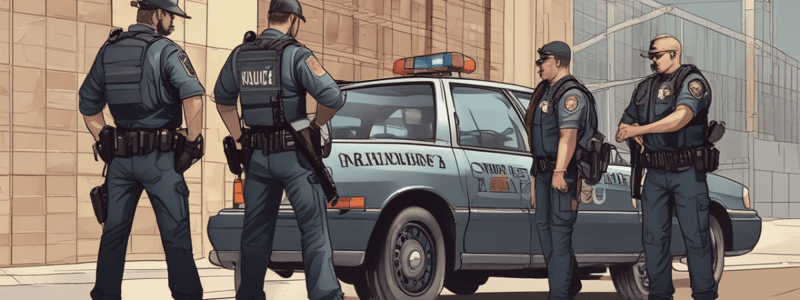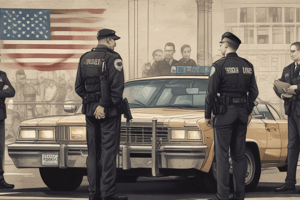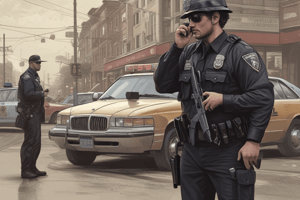Podcast
Questions and Answers
What is the general rule regarding the use of force in making an arrest?
What is the general rule regarding the use of force in making an arrest?
- Deadly force is always justified in making an arrest.
- Reasonable force may be used to place a suspect under arrest. (correct)
- Excessive force may be used to subdue a suspect.
- No force is allowed to be used in making an arrest.
What is the primary focus of the court's analysis in determining the reasonableness of an officer's actions?
What is the primary focus of the court's analysis in determining the reasonableness of an officer's actions?
- The officer's subjective intent or motivation.
- The police conduct, viewed objectively, in light of the circumstances confronting the officers. (correct)
- The use of deadly force in every situation.
- The severity of the crime at issue.
What is considered a factor in determining the reasonableness of an officer's actions?
What is considered a factor in determining the reasonableness of an officer's actions?
- The officer's prior experience with similar situations.
- The time of day the arrest was made.
- The suspect's prior criminal history.
- Whether the suspect posed an immediate threat to the officers or others. (correct)
What is the ultimate inquiry in determining the reasonableness of an officer's actions?
What is the ultimate inquiry in determining the reasonableness of an officer's actions?
What is the definition of deadly force in the context of making an arrest?
What is the definition of deadly force in the context of making an arrest?
In which case did the U.S. Supreme Court describe the circumstances under which the use of deadly force may be reasonable?
In which case did the U.S. Supreme Court describe the circumstances under which the use of deadly force may be reasonable?
What is the primary consideration in determining the reasonableness of an officer's actions in making an arrest?
What is the primary consideration in determining the reasonableness of an officer's actions in making an arrest?
What is the purpose of the Fourth Amendment analysis in determining the reasonableness of an officer's actions?
What is the purpose of the Fourth Amendment analysis in determining the reasonableness of an officer's actions?
When is the use of deadly force by a police officer permissible?
When is the use of deadly force by a police officer permissible?
What is the ruling in Scott v. Harris, 550 U.S. 372 (2007)?
What is the ruling in Scott v. Harris, 550 U.S. 372 (2007)?
Under what circumstances is a law enforcement officer justified in the use of any force?
Under what circumstances is a law enforcement officer justified in the use of any force?
What is the exception to the rule that a person is not justified in the use of force to resist an arrest?
What is the exception to the rule that a person is not justified in the use of force to resist an arrest?
In a Terry Stop, when can law enforcement officers use drawn weapons?
In a Terry Stop, when can law enforcement officers use drawn weapons?
When is the use of deadly force justified in defense of a person?
When is the use of deadly force justified in defense of a person?
What is the requirement for a law enforcement officer to use deadly force in F.S.§776.05?
What is the requirement for a law enforcement officer to use deadly force in F.S.§776.05?
What is the ruling in Terry v. Ohio, 392 U.S.1 (1968)?
What is the ruling in Terry v. Ohio, 392 U.S.1 (1968)?
What is the exception to the use of force in defense of a person?
What is the exception to the use of force in defense of a person?
Under what circumstances is a law enforcement officer justified in using non-deadly force to effect an arrest?
Under what circumstances is a law enforcement officer justified in using non-deadly force to effect an arrest?
Under which circumstances is a person presumed to have a reasonable fear of imminent death or great bodily harm?
Under which circumstances is a person presumed to have a reasonable fear of imminent death or great bodily harm?
When is the presumption of reasonable fear of imminent death or great bodily harm not applicable?
When is the presumption of reasonable fear of imminent death or great bodily harm not applicable?
Who is presumed to enter a dwelling, residence, or vehicle with the intent to commit an unlawful act involving force or violence?
Who is presumed to enter a dwelling, residence, or vehicle with the intent to commit an unlawful act involving force or violence?
Under what circumstances does a person have no duty to retreat and has the right to use deadly force?
Under what circumstances does a person have no duty to retreat and has the right to use deadly force?
What is the requirement for a law enforcement agency to make an arrest in cases of use of force?
What is the requirement for a law enforcement agency to make an arrest in cases of use of force?
When does a person using deadly force have no presumption of reasonable fear of imminent death or great bodily harm?
When does a person using deadly force have no presumption of reasonable fear of imminent death or great bodily harm?
What is the exception to the rule that a person using deadly force has a presumption of reasonable fear of imminent death or great bodily harm?
What is the exception to the rule that a person using deadly force has a presumption of reasonable fear of imminent death or great bodily harm?
What is the standard procedure for a law enforcement agency to investigate use of force?
What is the standard procedure for a law enforcement agency to investigate use of force?
In which circumstance can an officer claim Stand Your Ground immunity?
In which circumstance can an officer claim Stand Your Ground immunity?
What is the court's primary concern in determining whether an officer's use of force is reasonable?
What is the court's primary concern in determining whether an officer's use of force is reasonable?
What is the holding in the case of State v. Peraza?
What is the holding in the case of State v. Peraza?
When can an officer use deadly force against a suspect?
When can an officer use deadly force against a suspect?
What is a relevant factor in determining whether an officer's use of force is reasonable?
What is a relevant factor in determining whether an officer's use of force is reasonable?
Flashcards are hidden until you start studying
Study Notes
Use of Force in Making an Arrest
- Reasonable force may be used to place a suspect under arrest, with the permissible level of force varying from situation to situation.
- The essential principle remains that the force used must be reasonable under the particular circumstances surrounding the arrest.
- Factors considered in determining the reasonableness of an officer's actions include:
- The severity of the crime at issue
- Whether the suspect posed an immediate threat to the officers or others
- Whether the suspect was actively resisting arrest or attempting to evade arrest by flight
Use of Deadly Force
- Deadly force is a level of force that is reasonably likely to cause death or serious bodily injury.
- The use of deadly force is reasonable and permissible in certain circumstances, including:
- When the officer has probable cause to believe that the suspect poses a threat of serious physical harm to the officer or others.
- When the suspect has committed a crime involving the infliction or threatened infliction of serious physical harm.
Florida Legal Guidelines
- Under F.S.§776.05, a law enforcement officer is justified in the use of any force:
- Which he or she reasonably believes to be necessary to defend himself or herself or another from bodily harm while making the arrest.
- When necessarily committed in retaking felons who have escaped.
- When necessarily committed in arresting felons fleeing from justice.
Use of Force in Resisting an Arrest
- A person is not justified in the use of force to resist an arrest by a law enforcement officer.
- However, the law enforcement officer is not justified in the use of force if the arrest is unlawful and known to the officer as being unlawful.
Use of Force in a Terry Stop
- Law enforcement officers may use drawn weapons in a Terry Stop when they reasonably believe that the use of weapons is necessary to protect the officers or prevent a suspect's ability to flee.
Use of Force in Defense of Person
- A person is justified in the use of force, except deadly force, against another when and to the extent that they reasonably believe that such conduct is necessary to defend themselves or another against the imminent use of unlawful force.
- The use of deadly force is justified if it is reasonably believed to be necessary to prevent imminent death or great bodily harm.
Presumptions and Exceptions
- A person using defensive deadly force is presumed to have a reasonable fear of imminent death or great bodily harm if:
- The person against whom force was used was unlawfully and forcefully entering a dwelling, residence, or occupied vehicle.
- The person using deadly force knew or had reason to believe an unlawful and forcible entry or unlawful and forcible act was occurring.
- This presumption does not apply if:
- The person against whom force was used had a lawful right to be in the residence or vehicle.
- The person being removed was a child, grandchild, or otherwise in the lawful custody of the person against whom force was used.
- The person using deadly force was engaged in an unlawful act.
- The person against whom deadly force was used was a law enforcement officer engaged in the performance of official duties.
Investigation of Use of Force
- A law enforcement agency may use standard procedures to investigate use of force, but may not make an arrest unless there is probable cause to believe force was used unlawfully.
Stand Your Ground Immunity for Law Enforcement Officers
- A law enforcement officer can be entitled to Stand Your Ground immunity, despite being a law enforcement officer.
- This immunity is granted if the officer reasonably believes using deadly force is necessary to prevent imminent death or great bodily harm.
- The officer's belief of imminent danger can extend to themselves, their sergeant, and nearby citizens.
- The court case State v. Peraza (226 So. 3d 937 (Fla. 4th DCA 2017)) supports this entitlement.
Studying That Suits You
Use AI to generate personalized quizzes and flashcards to suit your learning preferences.



